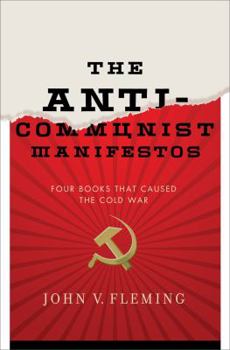Anti-Communist Manifestos: Four Books That Shaped the Cold War
Select Format
Select Condition 
Book Overview
The subject of The Anti-Communist Manifestos is four influential books that informed the great political struggle known as the Cold War: Darkness at Noon (1940), by Arthur Koestler, a Hungarian journalist and polymath intellectual; Out of the Night (1941), by Jan Valtin, a German sailor and labor agitator; I Chose Freedom (1946), by Victor Kravchenko, a Soviet engineer; and Witness (1952), by Whittaker Chambers, an American journalist. The authors...
Format:Hardcover
Language:English
ISBN:0393069257
ISBN13:9780393069259
Release Date:August 2009
Publisher:W. W. Norton & Company
Length:364 Pages
Weight:1.13 lbs.
Dimensions:1.3" x 6.0" x 9.3"
Customer Reviews
4 ratings
Terrific recreation of the beginnings of the literary cold war
Published by Thriftbooks.com User , 14 years ago
This is a superbly researched and well-written book. At this date it's hard to believe so many otherwise intelligent people were taken in by massive evil that was communism, but Fleming vividly recreates a very interesting slice of history, allowing the reader to see how so many were duped, thus making these four books so necessary and important. Bravo.
Witnesses to Reality
Published by Thriftbooks.com User , 14 years ago
John V. Fleming's "The Anti-Communist Manifestos" excellently performs service to those who would know the history, literary and cultural, of four great books dedicated to the cause of truth. With style and insight, Fleming unpacks the ironies and contradictions that infested the West during the age of international Communism; revealing, as he does, the farce of unfounded utopian faith. The author's recounting of the works of Koestler, Valtin (Krebs), Kravchenko, and Chambers should induce, in the very least, a curiosity to explore the writings themselves. Telling the tales from the perspective of one who is familiar with the texts that, in turn, influenced these men, Fleming offers invaluable insights. Because Marxist thought and its varieties of socialist offspring are by no means simply things of the past, the writings examined by Fleming retain much relevance. His essay on Whittaker Chambers' masterpiece "Witness" is itself worthy of multiple reads and reflection; for Chambers identified a war between two worldviews - that of unfettered idealism and that of fractured reality. The former perspective leads to a kind of phantasmic irrationality necessitating absurd apologias; the other can lead either to unwholesome despair or informed action. And, there is a third way, that of profound neglect. The majority, those who follow the third path, currently imperil civilization. In the war of the worldviews, it may not be overstatement to declare Chambers' "Witness" and Solzhenitsyn's "Gulag Archipelago" the most important books of the 20th century. Thankfully, their courageous efforts inspired action. Professor Fleming has written a very impressive book. Once you commence reading, you will not put it aside. When you have finished, you will be motivated to read (or, re-read) the subject authors' writings, as well others who have sought to inform regarding the dangers of the collectivist fixation that still obsesses the cognoscenti.
Great Reading for Anyone Interested in the Cold War
Published by Thriftbooks.com User , 14 years ago
"The Anti-Communist Manifestos" is a brilliant, masterfully written cultural history about four books, all bestsellers in their day, which shaped the West's understanding of Stalinism and its crimes. The authors were all former Communist Party members, three of whom had worked for Soviet espionage before turning sides. Thus the authors themselves were as controversial as the books they wrote, fanning ideological debates about "facts" and "credibility" throughout the 1940s and 1950s. John Fleming's extraordinary achievement is to tell the stories of these books within the context of their public receptions while avoiding the partisan distortions which characterized the ideological debates then and even now. Arthur Koestler's novel, "Darkness at Noon" (1941), is one of the most important books of the 20th Century, while Whittaker Chambers's memoir, "Witness" (1952), remains famous for its detail regarding the author's accusations against Alger Hiss. The other two memoirs discussed are by a former thug / "organizer" of the German Communist Party, "Jan Valtin" (Richard Krebs), and by Victor Kravchenko, the first Soviet official to defect to the United States. Valtin's "Out of the Night" (1941) detailed the growth of the German Communist Party in the 20's and its destruction following the Nazi's seizure of power in the 1930's, along with lurid personal stories involving sex and violence. Kravchenko's "I Chose Freedom" (1946) triggered a pair of libel suits in France, which led to survivors of Stalin's slave labor camps testifying in open court. It was their testimony, that of the living victims of Stalinism, which became impossible to deny. "The Anti-Communist Manifestos" successfully navigates through history, literature, and politics, and a reader opening to any random page is likely to become immediately engrossed. I personally enjoyed the elegance of Fleming's comments on memoir, that "subjective objective" form of writing, and his persuasive argument that "Witness" has a literary importance that has been overlooked by those whose interests have been limited to the factual. Easy to understand why historians Tony Judt and Sean Wilentz have praised this book so enthusiastically.
Essential and Original Guide
Published by Thriftbooks.com User , 14 years ago
This is a brilliant analysis of the literary, philosophical, and political dimensions of four classic works. Fleming even-handedly discusses the complex political background, entering a life-or-death debate which is crucial to understanding the Cold War and its aftermath down to the present. He shows why the works should be read and re-read as literature, not just as the important historical documents they are. For example, he demonstrates why Koestler's "Darkness at Noon" is justly held to be one of the greatest novels of the Twentieth Century, and his placing it in context, during the ascendancy of Hitler and Stalin, is almost as fascinating as the breathtaking story within the novel. Throughout, Fleming writes with an entertaining and witty style that will engage any reader. I recommend it enthusiastically.




